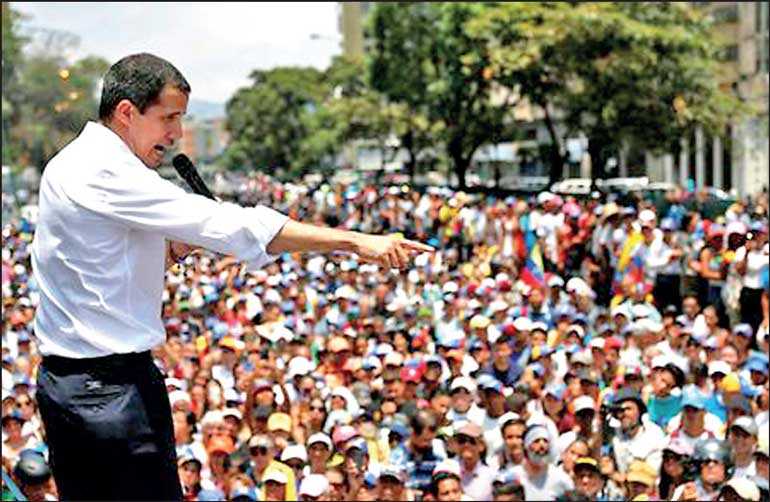Wednesday Feb 18, 2026
Wednesday Feb 18, 2026
Friday, 3 May 2019 00:00 - - {{hitsCtrl.values.hits}}

CARACAS (Reuters): Venezuelans heeded opposition leader Juan Guaido’s call to take to the streets on Wednesday in a bid to force President Nicolas Maduro from power, but there was little concrete sign of change in a crisis that increasingly looks like a political stalemate.
Guaido had called for the “largest march” in Venezuela’s history and said on Twitter that “millions of Venezuelans” were in the streets in “this final phase” of his move to oust Maduro.
But by late afternoon, many of the protesters in the capital Caracas had drifted home. National Guards fired tear gas at a hardcore of demonstrators who remained, and one injured demonstrator was carried by others to a first aid truck, Reuters video showed.
Rights organizations said a young woman died in surgery after being shot in the head during a protest in Caracas. Guaido confirmed via Twitter that a woman died after being shot.
The standoff in the South American country increased tensions between the United States and Russia, which accused each other of interference in the OPEC-member nation’s affairs.
Despite Guaido’s calls for the military to support him, the armed forces leadership has so far remained loyal to Maduro, who has been in power since his mentor, the late President Hugo Chavez, died in 2013.
“If the regime thought we had reached maximum pressure, they cannot even imagine,” Guaido told thousands of cheering supporters. “We have to remain in the streets.”
It was unclear what more Guaido can do at this point. The Venezuelan opposition has often staged huge street protests against Maduro but failed to dislodge him despite a deep economic recession and hyperinflation.
Demonstrators said they were prepared for the process of ousting Maduro to last a long time.
Guaido is recognized as Venezuela’s legitimate head of state by the United States, the European Union and others, while Maduro is backed by countries including Russia, China and Cuba.
Those fault lines are increasingly putting Venezuela at the heart of global geopolitical tensions.
US President Donald Trump’s administration has imposed sanctions on the Maduro government and refused to rule out military intervention, although it says it prefers a peaceful transition.
“Military action is possible. If that’s what’s required, that’s what the United States will do,” US Secretary of State Mike Pompeo told Fox Business Network.
The Pentagon appeared to downplay any active preparations to directly intervene in Venezuela, but acknowledged detailed contingency planning.
Russian Foreign Minister Sergei Lavrov told Pompeo on Wednesday that further “aggressive steps” in Venezuela would have grave consequences, Russia’s Foreign Ministry said.
In turn, the United States has accused Moscow of interfering in Venezuela, an ally of Russia since the time of Chavez. Pompeo said Maduro had been expected to flee the country on Tuesday but Russia convinced him to stay, which the Kremlin has denied.
White House national security adviser John Bolton, a foreign policy hawk, said Moscow’s involvement was not welcome.
China called for a political settlement via dialogue.
“We hope parties in Venezuela will proceed from the interests of the country and people, avoid bloody conflicts and restore the country’s stable development momentum as soon as possible,” the foreign ministry said in a statement on Thursday.